特殊句型——倒装
图片预览
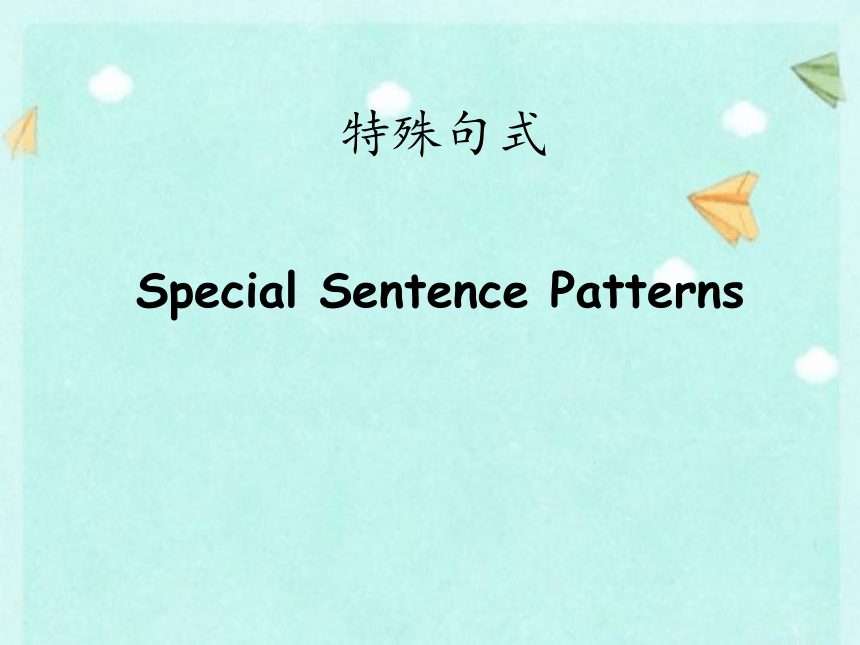
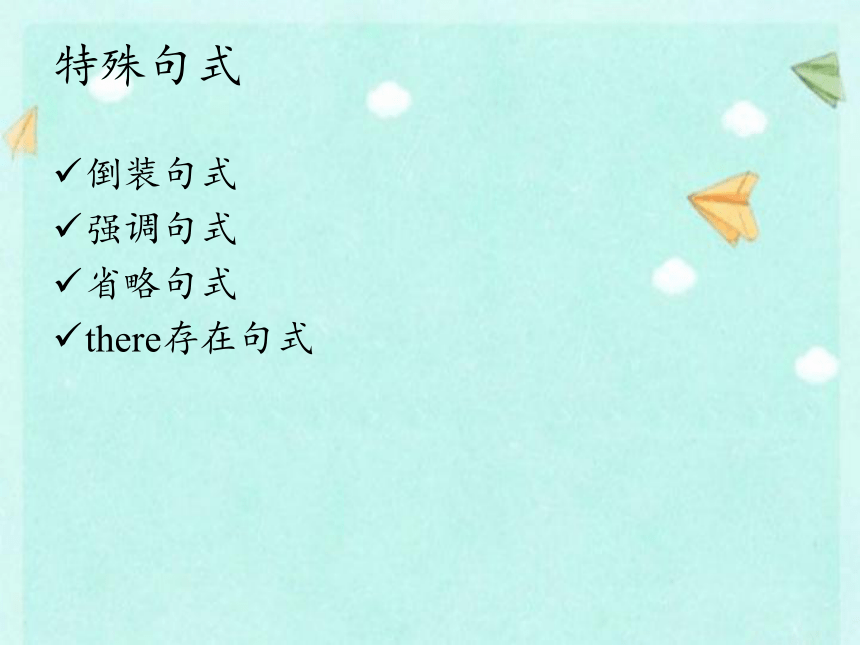

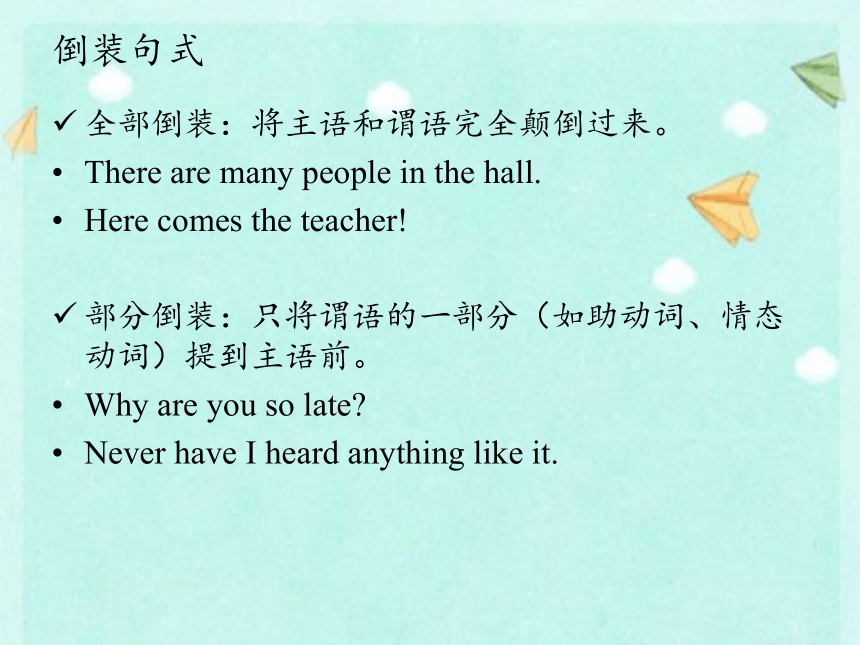
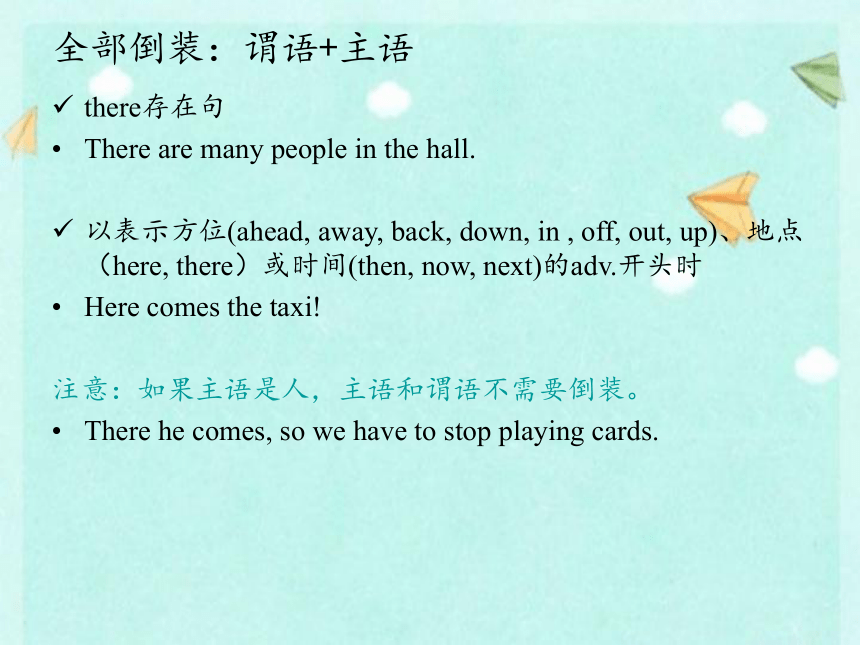
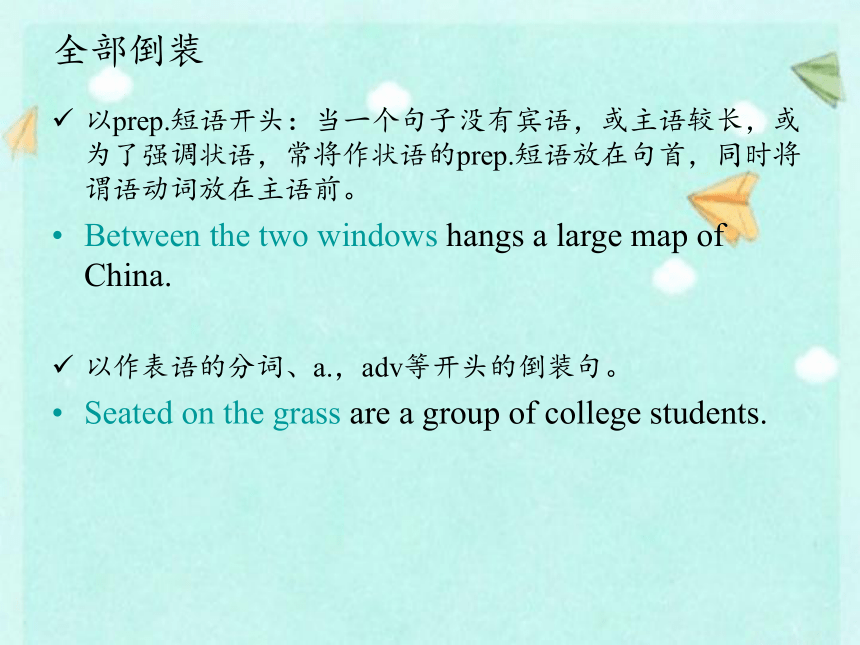

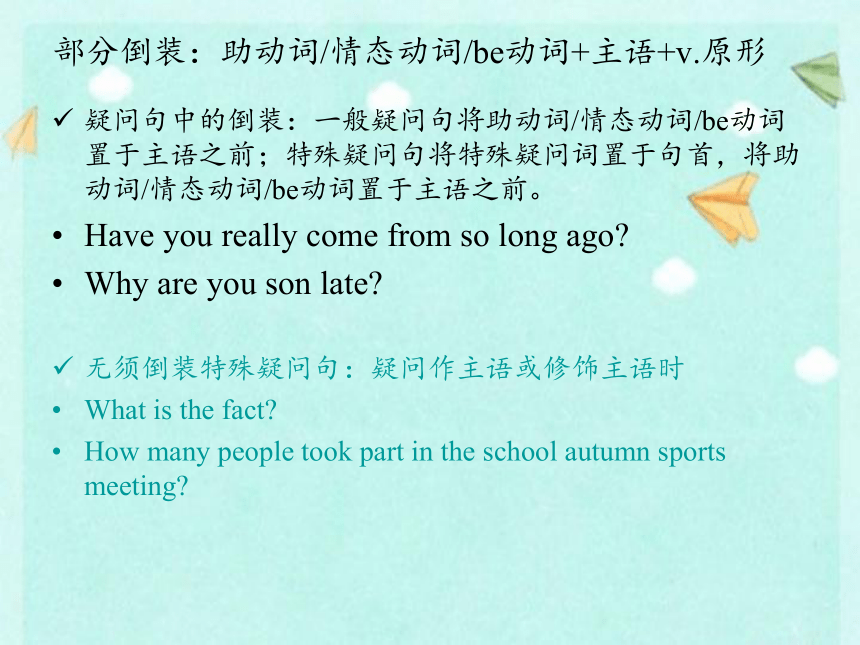

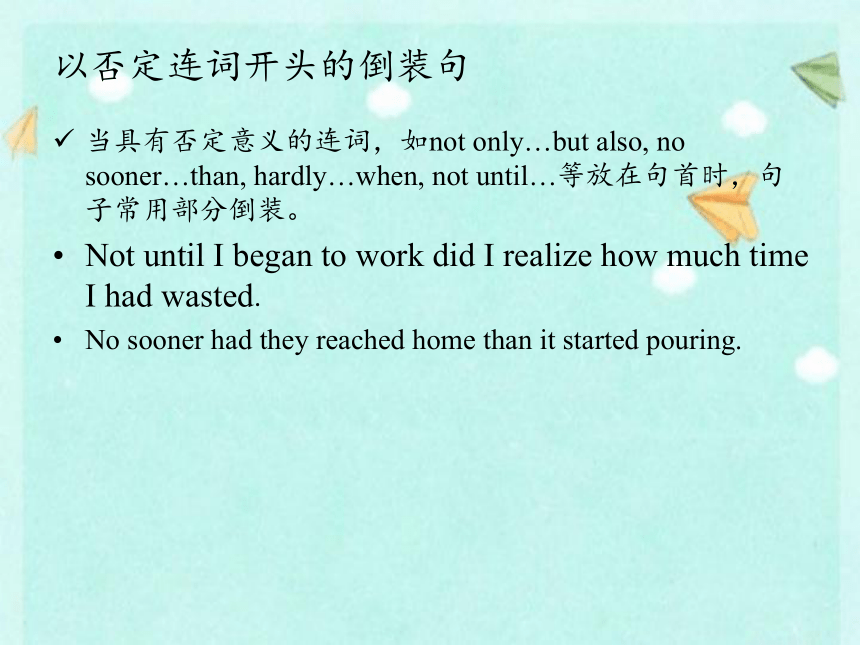
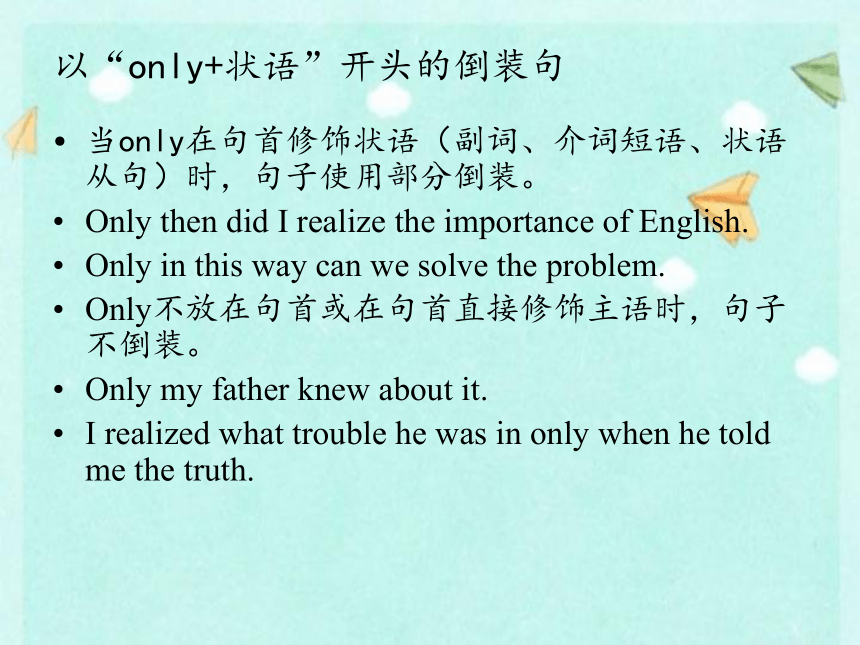
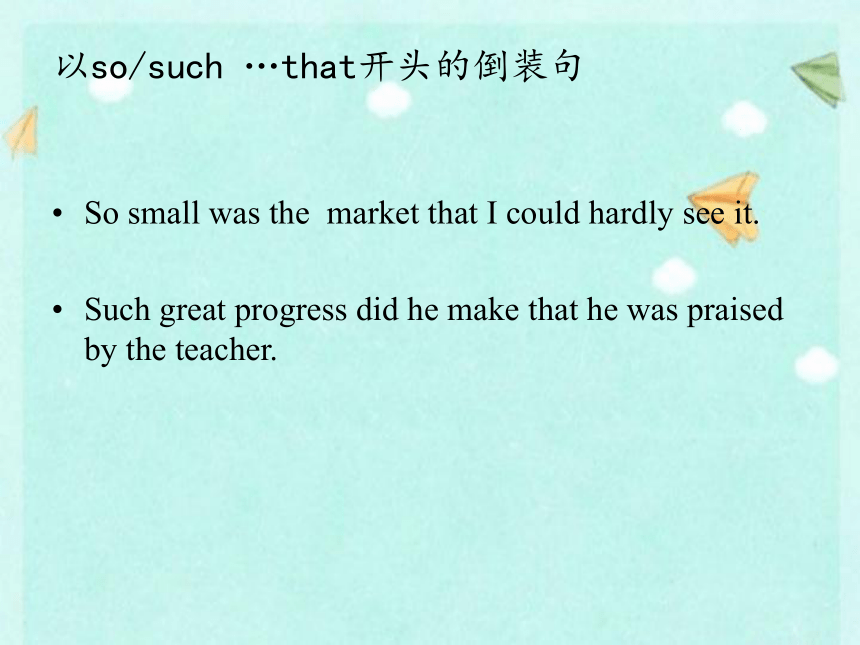
文档简介
(共45张PPT)
特殊句式
Special Sentence Patterns
特殊句式
倒装句式
强调句式
省略句式
there存在句式
倒装句式
全部倒装、部分倒装
倒装句式
全部倒装:将主语和谓语完全颠倒过来。
There are many people in the hall.
Here comes the teacher!
部分倒装:只将谓语的一部分(如助动词、情态动词)提到主语前。
Why are you so late
Never have I heard anything like it.
全部倒装:谓语+主语
there存在句
There are many people in the hall.
以表示方位(ahead, away, back, down, in , off, out, up)、地点(here, there)或时间(then, now, next)的adv.开头时
Here comes the taxi!
注意:如果主语是人,主语和谓语不需要倒装。
There he comes, so we have to stop playing cards.
全部倒装
以prep.短语开头:当一个句子没有宾语,或主语较长,或为了强调状语,常将作状语的prep.短语放在句首,同时将谓语动词放在主语前。
Between the two windows hangs a large map of China.
以作表语的分词、a.,adv等开头的倒装句。
Seated on the grass are a group of college students.
全部倒装
such谓语句首时用全部倒装,be动词须与后面的主语保持一致。
Such were the facts.
直接引语前置时。
“It’s the rule!” said the officer.
“What are you doing ” he asked. (主语时代词时不倒装)
部分倒装:助动词/情态动词/be动词+主语+v.原形
疑问句中的倒装:一般疑问句将助动词/情态动词/be动词置于主语之前;特殊疑问句将特殊疑问词置于句首,将助动词/情态动词/be动词置于主语之前。
Have you really come from so long ago
Why are you son late
无须倒装特殊疑问句:疑问作主语或修饰主语时
What is the fact
How many people took part in the school autumn sports meeting
以否定词语开头的倒装句
这类词主要有:never, seldom, neither, nor , hardly, little, not, nowhere , scarcely, rarely, by no means, at no time, on no account, under no circumstances等放在句首时,句子常用部分倒装。
Little do dream of seeing such wonderful scenery.
You will find that the environment isn’t very pleasant, neither is it healthful.
以否定连词开头的倒装句
当具有否定意义的连词,如not only…but also, no sooner…than, hardly…when, not until…等放在句首时,句子常用部分倒装。
Not until I began to work did I realize how much time I had wasted.
No sooner had they reached home than it started pouring.
以“only+状语”开头的倒装句
当only在句首修饰状语(副词、介词短语、状语从句)时,句子使用部分倒装。
Only then did I realize the importance of English.
Only in this way can we solve the problem.
Only不放在句首或在句首直接修饰主语时,句子不倒装。
Only my father knew about it.
I realized what trouble he was in only when he told me the truth.
以so/such …that开头的倒装句
So small was the market that I could hardly see it.
Such great progress did he make that he was praised by the teacher.
以so, neither/nor开头的倒装句
以so, neither/nor开头的句子表示重复前句部分内容,须部分倒装,且此句的谓语应与前句的谓语在时态形式上相一致。
I love this movie and so do all my friends.
He had none today nor would he have any the next day.
注意:
——The girls study hard.
——So they do.她们的确如此。
虚拟语气条件句的倒装
当虚拟语气条件句中省略if时,were, had, 或should须移置主语主语之前。
Were I in your position, I would ask him about the matter.
Had you come with us, I think you would have enjoyed Europe too.
让步状语从句的倒装
以as引导的让步状语从句,须用倒装语序。其结构为:adj./n. /adv. /v.原形+as+主语+其他。
Try as I might , I could not lift the stone.
尽管用尽力气,我还是搬不起这块石头。
Hard as he worked, he couldn’t earn enough even to support himself.
尽管他努力工作,他的收入甚至不够养活自己。
注意
Young though he is, he knows a lot.
他虽然年纪小,但懂得很多。
Our eating habits have changed, as has our way of life.
我们的饮食习惯已经改变了,如同我们的生活方式改变了一样。
频度副词置于句首时的倒装
当表示时间频率的状语位于句首,且表示强调时,用倒装语序;若不强调时,也可用自然语序。如:always, usually, often, once, every day等。
Often did we warn them not to do so.
强调句型
It is /was +强调部分+that/who/whom +其他成分
此句型可用来强调除谓语以外的各种句子成分,被强调部分必须放在it is/was 后面,如果强调的部分是人,可以who/whom 来代替that.
It is they that/who will have a meeting in the hall tomorrow.
It is a meeting that they will have in the hall tomorrow.
It is in the hall that they will have a meeting tomorrow.
It is tomorrow that they will have a meeting in the hall.
一般疑问句的强调
Did you meet your brother at Mc Donald
Was it your brother that you met at Mc Donald (强调宾语)
Has Tom borrowed your money recently
Is it Tom that has borrowed your money recently (强调主语)
特殊疑问句的强调
Where did you see her cell phone yesterday
Where was it that you saw her cell phone yesterday
(强调特殊疑问词where)
How will you go to visit her tomorrow
How is it that you will go to visit her tomorrow
(强调特殊疑问词how)
从句的强调
I came home late because it was raining hard.
It was because it was raining hard that I came home late.(强调状语从句)
What you said really made us sad.
It was what you said that really made us sad.(强调主语从句)
反义疑问句的强调
It is Mike who has won the first prize, isn’t it
It was last Sunday that you paid a visit to your English teacher, wasn’t it
not until 结构的强调
We did not get off the bus until it stopped .
It was not until it stopped that we got off the bus.
(注意:强调该结构时not until不能分开)
强调时间状语和地点状语时与定语从句的区别
It was in 1921 that our Party was founded.(强调句式)
It was 1921 when our Party was founded.(定语从句)
强调时间或地点时有介词置于其前时,则连接词用that。其前面应有介词而被省去时,则用连接词when(时间)或where(地点)。
It was on the farm that we practiced planting crops.
It was the farm where we learned a lot .
强调时间状语和地点状语时与定语从句的区别
但是应注意,有些表示时间或地点的词汇及短语本身不需要在其前面加介词,故其连词也只能是that,而不是when或where.
It was yesterday that we chatted a lot on line.
It was there that Mike was drowned yesterday.
It was last year ____ you taught me how to drive.
A. when B. that C. where D. which
It was ___ he said ____ disappointed me.
A. that/what B. who/that
C. that/what D. that/that
It was in the factory___ produced TV sets ____ our friend was murdered.
A. which / which B. that / which
C. that / that D. where / that
______ find my wallet ,Tom
A. Where did you that B. Where was it you
C. Where have you
D. Where was it that you
It was not until 1920___ regular radio broadcast began.
A. while B. which C. that D. since
It is the ability to do the job___ matters, not where you came from or what you are.
A. one B. it C. what D. that
强调句式与it相关句型的辨析
强调句式与主句主语为it的复合句
It is clear that they all like the little girl.
强调句式与“It is+时间+since从句”
It was five years ago that I began to learn English.
强调句式与“It was not long…before ”从句
It was three years later that he came back from abroad.
特殊强调
使用介词短语加强语气:in the world, on earth, at all.
What on earth can I talk about
使用重复加以强调
They walked for miles and miles.
使用very等特殊修饰词加以强调: very, just, only, own, single, right.
This is the very dictionary that I’m looking for.
使用助动词do/does/did强调谓语
As you can see, I did escape.
英语中有时为了避免重复,使语言简练紧凑,在不损害句子结构或不引起误解的原则下,往往省去一个或多个句子成分或词语。
省略句式
在以when, while, if, as if, though (although), as, whether, once等连词引导的时间、原因、条件、方式、让步等状语从句中,常常省略相同的主语或作主语的代词it以及be动词,保留现在分词、过去分词、介词短语、不定式等。
Though lacking of money, his parents managed to send him to university.
一、状语从句中句子成分的省略
1. Generally speaking, ________according to directions, the drug has no side effect.
A. when taking
B. when taken
C. when to take
D. when to be taken
二、动词不定式的省略:在同一句或联系紧密的对话里,常把不定式to后内容相同的部分省略,只保留to。
1. --- You should have thanked her before you left.
--- I meant ________, but when I was leaving I couldn't find her anywhere.
A. to do B. to
C. doing D. doing it
2. The boy wanted to ride his bicycle in the street, but his mother told him ________.
A . not to B. not to do
C. not do it D. do not to
三、虚拟条件句中连词if的省略
在虚拟条件句中,如含有had, were, should等时,if可省略,句子倒装。
Had I known that air conditioners cause so much pollution, I would have never bought one.
What would have happened ________, as far as the river bank
A. Bob had walked farther
B. if Bob should walk farther
C. had Bob walked farther
D. if Bob walked farther
--- Do you think it's going to rain over the weekend
--- ________.
A. I don't believe B. I don't believe it
C. I believe not so D. I believe not
四、宾语从句的省略
在同一句或联系紧密的对话里,后一句常常省略内容相同的宾语从句或从句的一部分。
五、主、谓、宾等成分的省略
在英语情景会话中,答语常常省略不会引起歧义的主语、谓语或宾语部分,而只保留对方希望了解的内容。在复合句或并列句中,也有省略主、谓、宾的情况。
---What do you think made Mary so upset
---________her new bicycle.
A. As she lost B. Lost
C. Losing D. Because of losing
2. One of the sides of the board should be painted yellow, and________.
A. the other is white B. another white
C. the other white D. another is white
3. --- Would you like some wine
--- Yes, just ________.
A. little B. very little
C. a little D. a few
表示某地有某物、某人或某事,有时也表强调。There是引导词,无实际意义,be后的名词是主语。
there存在句式
there存在句式
There be结构:be动词应遵循“就近原则”
Sometimes there are just two chairs and a table.
There +v.的结构:come,exist, happen, lie, live, occur, sit, stand, remain, rise等。
There lived a famous country doctor, but he went abroad later.
There 存在句式中的时态
There is/was/will be a rose bush in front of the office.
He said there was going to be a rose bush in front of the office.
There has never been anybody like you.
There 存在句式的其他形式
There must be…肯定有
There can’t be…不可能有
There may be…可能有
There ought to be…应该有
There used to be…曾经有过
There must/may have been…肯定/可能已经有过
There happens/happened to be…碰巧有
There is/was likely to be…可能有
There seems/seemed to be…似乎有
Examples
There’s likely to an interview.
There ought to have been someone on duty all the day.
There happened to be no one in my office when you phoned.
there 存在句式的非谓语形式
有there being和there to be两种形式,可作主、宾、状语等。
There being a railway station in the town is a great advantage.(作主语)
We expect there to be no objection.我们希望不会有人反对。(作宾语)
there 存在句式的非谓语形式
作prep.宾语:prep.是for,用there to be形式;prep不是for,则用there being形式。
What’s the chance of there being an election this year
Jill is waiting for there to be a big party.
there being作状语,构成独立主格结构
There being no further discussion, the chairman stood up and left the meeting room.
there 存在句的固定形式
There is no doubt that you will succeed.
毫无疑问,你会成功。
There is no point in arguing further.
继续争论下去毫无意义。
There is no use (in) trying to explain.
试图解释没有用。
There is no need to hurry.
不必着急。
There is no sense in making her angry.
惹她生气是没有道理的。
特殊句式
Special Sentence Patterns
特殊句式
倒装句式
强调句式
省略句式
there存在句式
倒装句式
全部倒装、部分倒装
倒装句式
全部倒装:将主语和谓语完全颠倒过来。
There are many people in the hall.
Here comes the teacher!
部分倒装:只将谓语的一部分(如助动词、情态动词)提到主语前。
Why are you so late
Never have I heard anything like it.
全部倒装:谓语+主语
there存在句
There are many people in the hall.
以表示方位(ahead, away, back, down, in , off, out, up)、地点(here, there)或时间(then, now, next)的adv.开头时
Here comes the taxi!
注意:如果主语是人,主语和谓语不需要倒装。
There he comes, so we have to stop playing cards.
全部倒装
以prep.短语开头:当一个句子没有宾语,或主语较长,或为了强调状语,常将作状语的prep.短语放在句首,同时将谓语动词放在主语前。
Between the two windows hangs a large map of China.
以作表语的分词、a.,adv等开头的倒装句。
Seated on the grass are a group of college students.
全部倒装
such谓语句首时用全部倒装,be动词须与后面的主语保持一致。
Such were the facts.
直接引语前置时。
“It’s the rule!” said the officer.
“What are you doing ” he asked. (主语时代词时不倒装)
部分倒装:助动词/情态动词/be动词+主语+v.原形
疑问句中的倒装:一般疑问句将助动词/情态动词/be动词置于主语之前;特殊疑问句将特殊疑问词置于句首,将助动词/情态动词/be动词置于主语之前。
Have you really come from so long ago
Why are you son late
无须倒装特殊疑问句:疑问作主语或修饰主语时
What is the fact
How many people took part in the school autumn sports meeting
以否定词语开头的倒装句
这类词主要有:never, seldom, neither, nor , hardly, little, not, nowhere , scarcely, rarely, by no means, at no time, on no account, under no circumstances等放在句首时,句子常用部分倒装。
Little do dream of seeing such wonderful scenery.
You will find that the environment isn’t very pleasant, neither is it healthful.
以否定连词开头的倒装句
当具有否定意义的连词,如not only…but also, no sooner…than, hardly…when, not until…等放在句首时,句子常用部分倒装。
Not until I began to work did I realize how much time I had wasted.
No sooner had they reached home than it started pouring.
以“only+状语”开头的倒装句
当only在句首修饰状语(副词、介词短语、状语从句)时,句子使用部分倒装。
Only then did I realize the importance of English.
Only in this way can we solve the problem.
Only不放在句首或在句首直接修饰主语时,句子不倒装。
Only my father knew about it.
I realized what trouble he was in only when he told me the truth.
以so/such …that开头的倒装句
So small was the market that I could hardly see it.
Such great progress did he make that he was praised by the teacher.
以so, neither/nor开头的倒装句
以so, neither/nor开头的句子表示重复前句部分内容,须部分倒装,且此句的谓语应与前句的谓语在时态形式上相一致。
I love this movie and so do all my friends.
He had none today nor would he have any the next day.
注意:
——The girls study hard.
——So they do.她们的确如此。
虚拟语气条件句的倒装
当虚拟语气条件句中省略if时,were, had, 或should须移置主语主语之前。
Were I in your position, I would ask him about the matter.
Had you come with us, I think you would have enjoyed Europe too.
让步状语从句的倒装
以as引导的让步状语从句,须用倒装语序。其结构为:adj./n. /adv. /v.原形+as+主语+其他。
Try as I might , I could not lift the stone.
尽管用尽力气,我还是搬不起这块石头。
Hard as he worked, he couldn’t earn enough even to support himself.
尽管他努力工作,他的收入甚至不够养活自己。
注意
Young though he is, he knows a lot.
他虽然年纪小,但懂得很多。
Our eating habits have changed, as has our way of life.
我们的饮食习惯已经改变了,如同我们的生活方式改变了一样。
频度副词置于句首时的倒装
当表示时间频率的状语位于句首,且表示强调时,用倒装语序;若不强调时,也可用自然语序。如:always, usually, often, once, every day等。
Often did we warn them not to do so.
强调句型
It is /was +强调部分+that/who/whom +其他成分
此句型可用来强调除谓语以外的各种句子成分,被强调部分必须放在it is/was 后面,如果强调的部分是人,可以who/whom 来代替that.
It is they that/who will have a meeting in the hall tomorrow.
It is a meeting that they will have in the hall tomorrow.
It is in the hall that they will have a meeting tomorrow.
It is tomorrow that they will have a meeting in the hall.
一般疑问句的强调
Did you meet your brother at Mc Donald
Was it your brother that you met at Mc Donald (强调宾语)
Has Tom borrowed your money recently
Is it Tom that has borrowed your money recently (强调主语)
特殊疑问句的强调
Where did you see her cell phone yesterday
Where was it that you saw her cell phone yesterday
(强调特殊疑问词where)
How will you go to visit her tomorrow
How is it that you will go to visit her tomorrow
(强调特殊疑问词how)
从句的强调
I came home late because it was raining hard.
It was because it was raining hard that I came home late.(强调状语从句)
What you said really made us sad.
It was what you said that really made us sad.(强调主语从句)
反义疑问句的强调
It is Mike who has won the first prize, isn’t it
It was last Sunday that you paid a visit to your English teacher, wasn’t it
not until 结构的强调
We did not get off the bus until it stopped .
It was not until it stopped that we got off the bus.
(注意:强调该结构时not until不能分开)
强调时间状语和地点状语时与定语从句的区别
It was in 1921 that our Party was founded.(强调句式)
It was 1921 when our Party was founded.(定语从句)
强调时间或地点时有介词置于其前时,则连接词用that。其前面应有介词而被省去时,则用连接词when(时间)或where(地点)。
It was on the farm that we practiced planting crops.
It was the farm where we learned a lot .
强调时间状语和地点状语时与定语从句的区别
但是应注意,有些表示时间或地点的词汇及短语本身不需要在其前面加介词,故其连词也只能是that,而不是when或where.
It was yesterday that we chatted a lot on line.
It was there that Mike was drowned yesterday.
It was last year ____ you taught me how to drive.
A. when B. that C. where D. which
It was ___ he said ____ disappointed me.
A. that/what B. who/that
C. that/what D. that/that
It was in the factory___ produced TV sets ____ our friend was murdered.
A. which / which B. that / which
C. that / that D. where / that
______ find my wallet ,Tom
A. Where did you that B. Where was it you
C. Where have you
D. Where was it that you
It was not until 1920___ regular radio broadcast began.
A. while B. which C. that D. since
It is the ability to do the job___ matters, not where you came from or what you are.
A. one B. it C. what D. that
强调句式与it相关句型的辨析
强调句式与主句主语为it的复合句
It is clear that they all like the little girl.
强调句式与“It is+时间+since从句”
It was five years ago that I began to learn English.
强调句式与“It was not long…before ”从句
It was three years later that he came back from abroad.
特殊强调
使用介词短语加强语气:in the world, on earth, at all.
What on earth can I talk about
使用重复加以强调
They walked for miles and miles.
使用very等特殊修饰词加以强调: very, just, only, own, single, right.
This is the very dictionary that I’m looking for.
使用助动词do/does/did强调谓语
As you can see, I did escape.
英语中有时为了避免重复,使语言简练紧凑,在不损害句子结构或不引起误解的原则下,往往省去一个或多个句子成分或词语。
省略句式
在以when, while, if, as if, though (although), as, whether, once等连词引导的时间、原因、条件、方式、让步等状语从句中,常常省略相同的主语或作主语的代词it以及be动词,保留现在分词、过去分词、介词短语、不定式等。
Though lacking of money, his parents managed to send him to university.
一、状语从句中句子成分的省略
1. Generally speaking, ________according to directions, the drug has no side effect.
A. when taking
B. when taken
C. when to take
D. when to be taken
二、动词不定式的省略:在同一句或联系紧密的对话里,常把不定式to后内容相同的部分省略,只保留to。
1. --- You should have thanked her before you left.
--- I meant ________, but when I was leaving I couldn't find her anywhere.
A. to do B. to
C. doing D. doing it
2. The boy wanted to ride his bicycle in the street, but his mother told him ________.
A . not to B. not to do
C. not do it D. do not to
三、虚拟条件句中连词if的省略
在虚拟条件句中,如含有had, were, should等时,if可省略,句子倒装。
Had I known that air conditioners cause so much pollution, I would have never bought one.
What would have happened ________, as far as the river bank
A. Bob had walked farther
B. if Bob should walk farther
C. had Bob walked farther
D. if Bob walked farther
--- Do you think it's going to rain over the weekend
--- ________.
A. I don't believe B. I don't believe it
C. I believe not so D. I believe not
四、宾语从句的省略
在同一句或联系紧密的对话里,后一句常常省略内容相同的宾语从句或从句的一部分。
五、主、谓、宾等成分的省略
在英语情景会话中,答语常常省略不会引起歧义的主语、谓语或宾语部分,而只保留对方希望了解的内容。在复合句或并列句中,也有省略主、谓、宾的情况。
---What do you think made Mary so upset
---________her new bicycle.
A. As she lost B. Lost
C. Losing D. Because of losing
2. One of the sides of the board should be painted yellow, and________.
A. the other is white B. another white
C. the other white D. another is white
3. --- Would you like some wine
--- Yes, just ________.
A. little B. very little
C. a little D. a few
表示某地有某物、某人或某事,有时也表强调。There是引导词,无实际意义,be后的名词是主语。
there存在句式
there存在句式
There be结构:be动词应遵循“就近原则”
Sometimes there are just two chairs and a table.
There +v.的结构:come,exist, happen, lie, live, occur, sit, stand, remain, rise等。
There lived a famous country doctor, but he went abroad later.
There 存在句式中的时态
There is/was/will be a rose bush in front of the office.
He said there was going to be a rose bush in front of the office.
There has never been anybody like you.
There 存在句式的其他形式
There must be…肯定有
There can’t be…不可能有
There may be…可能有
There ought to be…应该有
There used to be…曾经有过
There must/may have been…肯定/可能已经有过
There happens/happened to be…碰巧有
There is/was likely to be…可能有
There seems/seemed to be…似乎有
Examples
There’s likely to an interview.
There ought to have been someone on duty all the day.
There happened to be no one in my office when you phoned.
there 存在句式的非谓语形式
有there being和there to be两种形式,可作主、宾、状语等。
There being a railway station in the town is a great advantage.(作主语)
We expect there to be no objection.我们希望不会有人反对。(作宾语)
there 存在句式的非谓语形式
作prep.宾语:prep.是for,用there to be形式;prep不是for,则用there being形式。
What’s the chance of there being an election this year
Jill is waiting for there to be a big party.
there being作状语,构成独立主格结构
There being no further discussion, the chairman stood up and left the meeting room.
there 存在句的固定形式
There is no doubt that you will succeed.
毫无疑问,你会成功。
There is no point in arguing further.
继续争论下去毫无意义。
There is no use (in) trying to explain.
试图解释没有用。
There is no need to hurry.
不必着急。
There is no sense in making her angry.
惹她生气是没有道理的。
